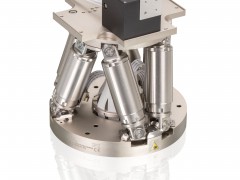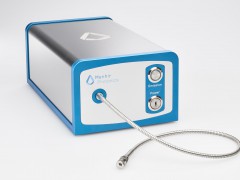
Laser Scanner Could Help Diagnose Disease Before Vision Loss Occurs
source:Photonics
release:Nick
keywords: Laser Scanner Medical laser applications
Time:2017-12-29
BURNABY, British Columbia, Dec. 28, 2017 — A retinal imaging scanner has been developed that can produce high-resolution, 3D cross-sectional images of the retina, including individual photoreceptors and fine capillaries. The scanner is extremely compact (about the size of a shoebox), making it suitable for everyday use in medical clinics and hospitals. The new scanner could help ophthalmologists diagnose eye diseases before vision loss occurs. Currently, physicians use low-resolution scanners that can only assess and diagnose the cause of dead retina cells after a patient’s vision is impacted.
“It’s a breakthrough in clinical diagnostics,” said the scanner’s inventor, professor Marinko Sarunic from Simon Fraser University. “With the high-resolution scanner, ophthalmologists and optometrists can detect damage and changes to small numbers of individual photoreceptors, giving them a diagnosis before the patient loses vision and the potential to take preventative measures.”

A compact, high-resolution retinal imaging scanner developed by a Simon Fraser University engineer could help with early detection of eye disease. Courtesy of Simon Fraser University.
The scanner was tested over a period of eight months by ophthalmologists at Vancouver General Hospital’s Eye Care Center.
Dr. Eduardo Navajas, a vitreoretinal specialist, said the scanner eliminates the need for, and complications related to, dye injections that are currently used to diagnose and monitor eye diseases like diabetic retinopathy and wet age-related macular degeneration (AMD).
“Early detection of abnormal blood vessels caused by wet AMD and diabetes is essential to saving a patient's vision,” said Navajas. “Dr. Sarunic’s new imaging technology is benefiting patients, allowing us to diagnose and treat wet AMD and diabetic eye disease before patients develop bleeding and permanent damage to their retina.”
“It’s a breakthrough in clinical diagnostics,” said the scanner’s inventor, professor Marinko Sarunic from Simon Fraser University. “With the high-resolution scanner, ophthalmologists and optometrists can detect damage and changes to small numbers of individual photoreceptors, giving them a diagnosis before the patient loses vision and the potential to take preventative measures.”

A compact, high-resolution retinal imaging scanner developed by a Simon Fraser University engineer could help with early detection of eye disease. Courtesy of Simon Fraser University.
The scanner was tested over a period of eight months by ophthalmologists at Vancouver General Hospital’s Eye Care Center.
Dr. Eduardo Navajas, a vitreoretinal specialist, said the scanner eliminates the need for, and complications related to, dye injections that are currently used to diagnose and monitor eye diseases like diabetic retinopathy and wet age-related macular degeneration (AMD).
“Early detection of abnormal blood vessels caused by wet AMD and diabetes is essential to saving a patient's vision,” said Navajas. “Dr. Sarunic’s new imaging technology is benefiting patients, allowing us to diagnose and treat wet AMD and diabetic eye disease before patients develop bleeding and permanent damage to their retina.”
MOST READ
- RoboSense is to Produce the First Chinese Multi-beam LiDAR
- China is to Accelerate the Development of Laser Hardening Application
- Han’s Laser Buys Canadian Fiber Specialist CorActive
- SPI Lasers continues it expansion in China, appointing a dedicated Sales Director
- Laser Coating Removal Robot for Aircraft
PRODUCTS
 FISBA exhibits Customized Solutions for Minimally Invasive Medical Endoscopic Devices at COMPAMED in
FISBA exhibits Customized Solutions for Minimally Invasive Medical Endoscopic Devices at COMPAMED in New Active Alignment System for the Coupling of Photonic Structures to Fiber Arrays
New Active Alignment System for the Coupling of Photonic Structures to Fiber Arrays A new industrial compression module by Amplitude
A new industrial compression module by Amplitude Menhir Photonics Introduces the MENHIR-1550 The Industry's First Turnkey Femtosecond Laser of
Menhir Photonics Introduces the MENHIR-1550 The Industry's First Turnkey Femtosecond Laser of Shenzhen DNE Laser introduced new generation D-FAST cutting machine (12000 W)
more>>
Shenzhen DNE Laser introduced new generation D-FAST cutting machine (12000 W)
more>>
